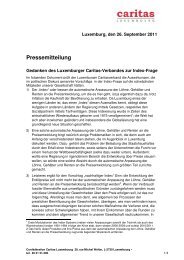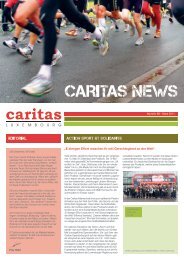Sozialalmanach - Caritas Luxembourg
Sozialalmanach - Caritas Luxembourg
Sozialalmanach - Caritas Luxembourg
Create successful ePaper yourself
Turn your PDF publications into a flip-book with our unique Google optimized e-Paper software.
EMU entrance exam has played a critical role for a second generation of national social<br />
pacts in the so-called hard-currency latecomer countries, like Greece, Italy and Portugal 19 .<br />
In the area of labour market policy, in the 1990s, the new objective became maximising<br />
employment rather than inducing labour market exit. The main policy trend here is a shift<br />
from passive financial transfers for those participating in the labour market towards activating<br />
measures in order to reduce dependency rates and increase the tax base. In the process,<br />
we witness notable increases in spending on active labour market policies, mobilizing women,<br />
youth, older workers, less productive workers, based on early intervention, case management<br />
and conditional benefits 20 . Public employment services (PES) in many countries, from the<br />
United Kingdom to Italy, and from Spain to Denmark, have been de-monopolized and<br />
turned into “modern service providers”, capable of effectively and efficiently delivering<br />
specialized services to an ever-growing clientele in outward-looking fashion.<br />
With respect to labour market regulation, several European countries have moved towards<br />
greater acceptance of flexible labour markets on the condition of strong matching social<br />
guarantees. Partial employment deregulation has been accompanied with steps toward<br />
labour market “flexicurity”, based on relaxed job protection but offering strong standards<br />
of social protection. Together with active labour market policies for the unemployed,<br />
flexicurity is intended to help bridge the gap between insiders and outsiders in mature<br />
welfare states and permit more flexible family models and individual life courses, with a<br />
view to preventing long-term dependency on income support 21 . In the 1990s, both the Danes<br />
and the Dutch critically deregulated their labour markets and strengthened job seeking<br />
with a series of active labour market policy measures. Classical measures of job security<br />
for labour insiders have been reformed only at the margin.<br />
Within the sphere of social insurance, we can observe how benefits generosity has been<br />
curtailed: eligibility has become more conditional and increasingly targeted at lower income<br />
groups in the majority of European welfare states 22 . A third general trend – which cuts<br />
across various social protection programs – has been greater “targeting” or “selectivity”<br />
of resources towards those most in need. At the same time, most countries have been<br />
strengthening a basic non-contributory safety net, such as the French RMI. In the course<br />
of the 1990s the “job first” principle has gradually made its way throughout European<br />
(un)employment protection systems 23 . Different strategies, based on national preferences,<br />
have experimented with constraints and opportunities, such as traditional means-testing,<br />
19 Levy (1999); Visser & Hemerijck (1997); Hemerijck & Visser (2003).<br />
20 Clasen (2005).<br />
21 Schmidt (2008).<br />
22 Ferrera & Hemerijck (2003); Van Gerven (2008).<br />
23 Clasen (2005).<br />
157








